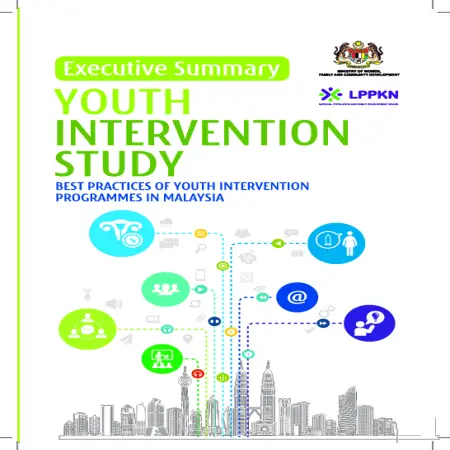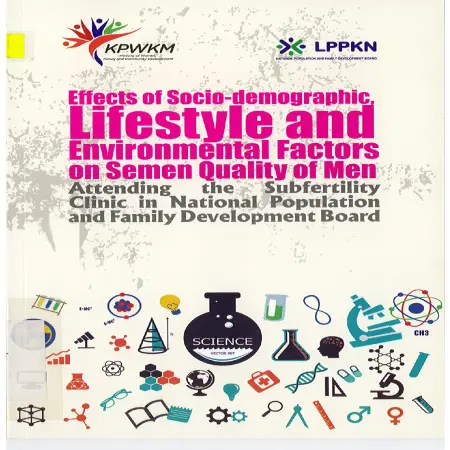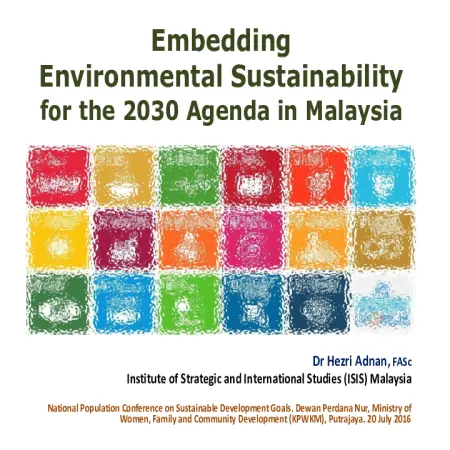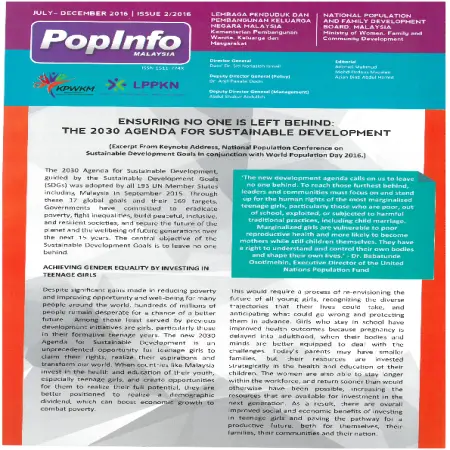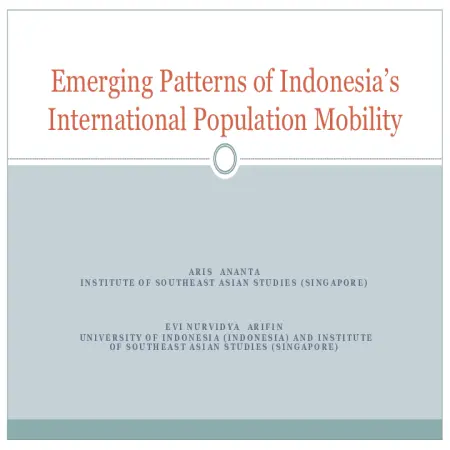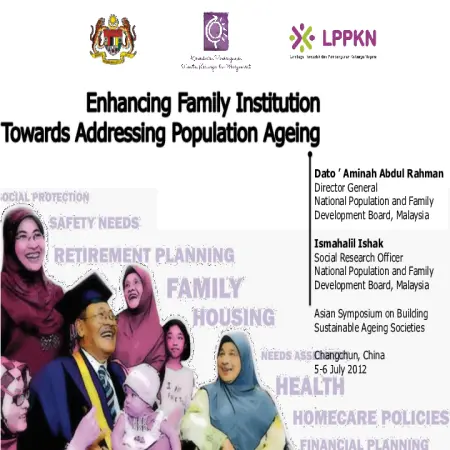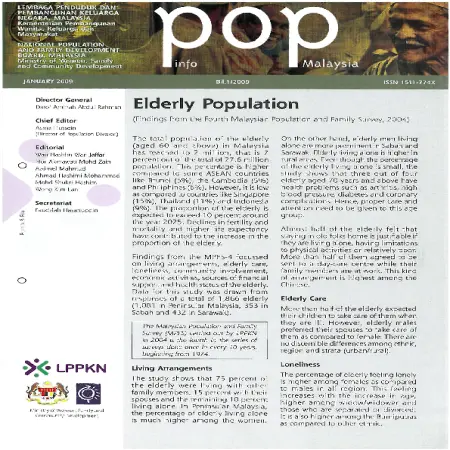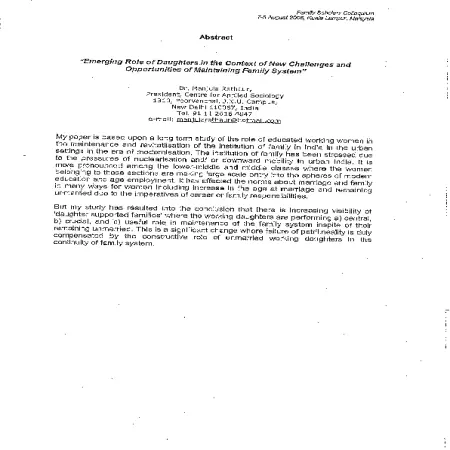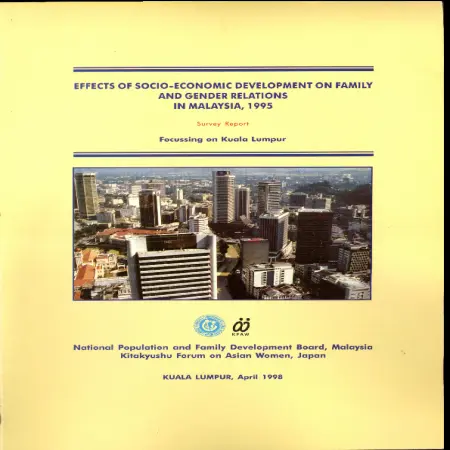Browse by Author
|
|
Executive Summary: youth intervention study: best practices of youth intervention programmes in Malaysia
Item Type: Research Report
Editor:
Year: 01/07/2020
Abstract: In the decades, Malaysia has undergone rapid economic, social and cultural changes which impacted not only the daily lives of its people but also their worldview and values. This is particularly so for young people, as excessive exposure to information from the social media, internet and pornography had inevitably influence their lifestyle and behaviour. The socio-cultural changes are likely associated with an increased rates of non-marital sexual activity, increased rates of sex partner change and increased rates of sexually transmitted infections (STIs). In 2005, the Ministry of Women, Family and Community Development through NPFDB introduced the PEKERTI Programme to be implemented at KafeTEEN adolescents centres. The programme provides reproductive health services, counseling services and education and skill building to promote a healthy life and inculcate positive attitudes and moral values among young people.
|
|
|
|
|
|
Effects of socio-demographic, lifestyle and environmental factors on semen quality of men attending the sub fertility clinic in National Population and Family Development Board
Item Type: Research Report
Editor:
Year: 02/01/2017
Abstract: Couples are considered infertile if they are unable to conceive after one year of regular unprotected sex. The impact of lifestyle and environment on human fertility may vary depending on aetiology, demographic characteristics, genetic variation and other factors. As used by previous researchers, semen parameters were used to measure male infertility. Therefore, a decrease in semen quality is considered as a major factor in male infertility (http://en.wikipedia.org/wiki/Semen_quality). Previous studies (Kidd et al.2001,Eskenazi et al.2003, de La Rochebrochard and Thonneau 2003) have found that older men tend to have lower semen quality than younger ones. Testicular hyperthermia (elevated temperature) also has been known to affect male fertility. Men who like taking hot baths or sit in a sedentary position for a long time are at risk of having infertility. The objectives of this study are to identify the relationship between socio-demographic profile, lifestyle and environmental factors and semen quality, and to identify risk factors of poor semen quality among men attending the National Population and Family Development Board's (NPFDB) Subfertility Clinic. This study was done in Andrology Laboratory, NPFDB. Five hundred men from couples having their first infertility consultation between September 2010 abd June 2011 were recruited. Each patient was required to register, deposit semen and fill in the quesstionnaire. Sperm concentration, morphology and motility from semen analysis were used to study the relationship between semen quality and independent variables. Reference limits used were 15 cells x 10'6/ml, 4% and 40 %, respectively (World Health Organization, 2010). For statistical analysis, descriptive statistic, t test and ANOVA were used; 0.05 alpha value was chosen. Results showed that one-third of the study population were between 26 to 30 years of age and another one third were aged between 31 to 35 years old; mean age was 33.2. majority were Malays (71.2%), resided in Selangor (64.3%) and professionals (41.6%). Semen quality showed a negative relationship (p<0.05) with age. Meanwhile, sperm motility varied significantly for different ethnic group. Chinese (57.75%) had the highest motile-sperm compared to Malays (53.44%) and Indians (46.60%). Among lifestyles variables, frequency of sexual intercourse had a posive relationship (p<0.05) with sperm motility, whilst sedentary position had negative relationship (p<0.05) with the latter. Regression analysis was used to predict the risk factors of poor semen quality. This study found that men above 30 years old were two times more likely to have low sperm motility than men in the twenties. Moreover, less frequent sexual activity between couples was more likely (p<0.05) to have abnormal sperm compared to those who had sexual intercourse more frequently. In conclusion, this study suggested that age over 30 years and infrequent sexual activity were the risk factors to lower semen quality. Even though not regarded as a risk factor, sedentary work position had a negative impact on sperm motility. These factors may affect male fertility and cause difficulty in conception. Public awareness through advocacy programs and talks on infertility and its risk factors should be carried out regularly. Public education should be carried out to advice men to practice a healthy lifestyle and work life balance. This study has shown encouraging results, and should be replicated in the general population in Malaysia
|
|
|
|
|
|
Embedding the environment sustainability for the 2030 agenda in Malaysia
Item Type: Conference or Workshop Item
Editor:
Year: 00/00/2016
Abstract: The presentation will outline the rationale and overarching vision for embedding the environment in the SDGs. These are guided by four interlocking ideas: the environment is a prerequisite for socio-economic development; human health and wellbeing depends on good environmental quality; environment has intrinsic values; and finally, protecting the environment can be a new source of economic growth.
|
|
|
|
|
|
Ensuring no one is left behind: the 2030 agenda for sustainable development
Item Type: Newsletter
Editor:
Year: 00/00/2016
Abstract: The 2030 Agenda for Sustainable Development, guided by the Sustainable Development Goals (SDGs) was adopted by all 193 UN Member States including Malaysia in September 2015. Through these 17 global goals and their 169 targets, Government have committed to eradicate poverty, fight inequalities, build peaceful, inclusive, and resilient societies, and secure the future of the planet and the well being of future generations over the next 15 years. The central objective of the Sustainable Development Goals is to leave no one behind.
|
|
|
|
|
|
Ethnicity and support for parents in Malaysia
Item Type: Article
Editor:
Year: 00/12/2013
Abstract: This study analyzed support as reported by adult women to parents and parents-in-law in a multi-ethnic setting. It examined ethnic diversity and other influencing factors in the provision of support. Data utilized came from the Women sample of the 2004 Malaysian Population and Family Survey and was filtered to include the three largest ethnic groups in Malaysia- Malays, Chinesse and Indians.
|
|
|
|
|
|
Emerging patterns of Indonesia's international population mobility
Item Type: Conference or Workshop Item
Editor:
Year: 00/00/2013
Abstract: This paper attempts to examine some new trends in Indonesia’s international migration, both out-migration from and in-migration to Indonesia. More and more Indonesians have moved to other countries to pursue higher education, job opportunities and to settle down. On the other hand, rapid economic growth and the large consumer market have attracted increasing number of foreigners to work and invest in Indonesia. International population mobility is becoming a more important demographic process, with profound ramifications on economic development in Indonesia and other countries, in ASEAN and beyond.
|
|
|
|
|
|
Enhancing family institution towards addressing population ageing
Item Type: Conference or Workshop Item
Editor:
Year: 00/00/2012
Abstract: Malaysia will be aged by the year 2030. The objective of National Policy for Older Persons, 2011 is to enhance the respect for and self-worth of the elderly in family, society and nation at the same time to develop the potential of the elderly so that they remain active and productive in national development and to create opportunities for them to continue to live independently and to encourage the establishment and the provision of specific facilities to ensure the care and protection of the elderly. The areas of Plan of Action: Promotion and Advocacy, Lifelong Learning, Safety and Protection, Governance and Shared Reasonability, Involvement and Intergenerational Solidarity, Research and Development.
|
|
|
|
|
|
Elderly population
Item Type: Newsletter
Editor:
Year: 00/01/2009
Abstract: The total population of the elderly (aged 60 and above) in Malaysia has reached to 2 million, that is 7 per cent out of the total of 27.6 million population. The proportion of the elderly is expected to exceed 10 per cent around the year 2025. Finding from the MPFS-4 focussed on living arrangements, elderly care, loneliness, community involvement, economic activities, sources of financial support and health status of the elderly. Data for this study was drawn from responses of a total of 1,866 elderly.
|
|
|
|
|
|
Emerging role of daughters in the context of new challenges and opportunities of maintaining family system
Item Type: Conference or Workshop Item
Editor:
Year: 00/00/2006
Abstract: My paper is based upon a long term study of the role of educated working women in the maintenance and revitatlisation of the institution of family in India in the urban settings in the era of modernisation. The institution of family has been stressed due to the pressures of nuclearisation and/or downward mobility in urban India. It is more pronounced among the lower-middle and middle classes where the women belonging to these sections are making large scale entry into the spheres of modern education and age employment. It has affected the norms about marriage and family in many ways for women including increase in the age at marriage and remaining unmarried due to the imperatives of career of family responsibilities. But my study has resulted into the conclusion that there is increasing visibility of 'daughter supported families' where the working daughters are performing a) central, b) crucial, and c) useful role in maintenance of the family system inspite of their remaining unmarried. This is a significant change where failure of patrilineality is duly compensated by the constructive role of unmarried working daughters in the continuity of family system.
|
|
|
|
|
|
Effects of socio-economic development on family and gender relations in Malaysia, 1995: focussing on Kuala Lumpur
Item Type: Research Report
Editor:
Year: 00/04/1998
Abstract: This study attempts to inquire into the effects of socio economic development on families and gender relations in Malaysia societies living in urban areas, focusing on the capital city of Kuala Lumpur. These effects which the research attempts to study are found in the everyday lives of the Malaysian families such as family bonds, family satisfactions, identities, attitudes, norms, conjugal relations, parent and child relations and the family's support network. A total of 1,200 respondents consisting of males and females, aged 18 years and above living in and around Kuala Lumpur and within the Klang Valley had been selected for the survey.
|
|
|
|





